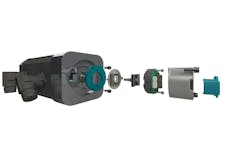Innovation in Servomotor Feedback: Magnetic Kit Encoders from POSITAL Feature Multi-Turn Range with No Need for Backup Batteries
POSITAL’s new family of kit encoders provide the manufacturers of servomotors and other machinery with rugged, accurate and cost-efficient tools for building rotary position measurements into their products. The new kit encoders are based on POSITAL’s highly successful self-contained magnetic rotary encoders. Now however, the core components of these instruments are available as separate assemblies that can be readily integrated into other products.
The POSITAL kit encoder components offer a number of advantages over the rotation measuring devices that have traditionally been used with servomotors and rotating equipment. Compared to resolvers, they are more accurate and offer multi-turn measurement capabilities. They also provide digital outputs instead of the analog signals produced by resolvers. While POSITAL’s magnetic encoder technology provides slightly less precision than the best optical disk encoders, it is less costly, less vulnerable to contamination from oil or dust and more resistant to shock and vibration. POSITAL encoders also provide an all-electronic multi-turn absolute position measuring capability that evaluates the full absolute angular position, including the total number of shaft rotations. The rotation counter is powered by the company’s well-proven Wiegand-effect energy harvesting technology so that rotation counts are always accurate, even if the rotations occur when external power is unavailable. This system eliminates the need for backup batteries or for the geared optical disks used in some products.
POSITAL magnetic kit encoders are easy to incorporate into normal manufacturing processes since they don’t require extra-precision, near-cleanroom assembly conditions. A built-in self-calibration capability can compensate for small sensor-to-shaft alignment errors. The electronic components, including Hall-effect sensors, a 32-bit microprocessor and the Wiegand-wire energy harvesting system, are packaged in a convenient 36 mm diameter, 24.2mm deep unit. For servomotors with magnetic brakes, a special magnetic shield has been developed to isolate the magnetic pickups of the measurement system from the external magnetic fields.
The resolution of the new POSITAL kit encoders is 17 bit, with an accuracy of better than + 0.1°. The operating temperature range is -40 to +105 °C. These devices are available with a variety of non-proprietary communications protocols, including BISS, SSI and RS485-based protocols.
For more information, click here

